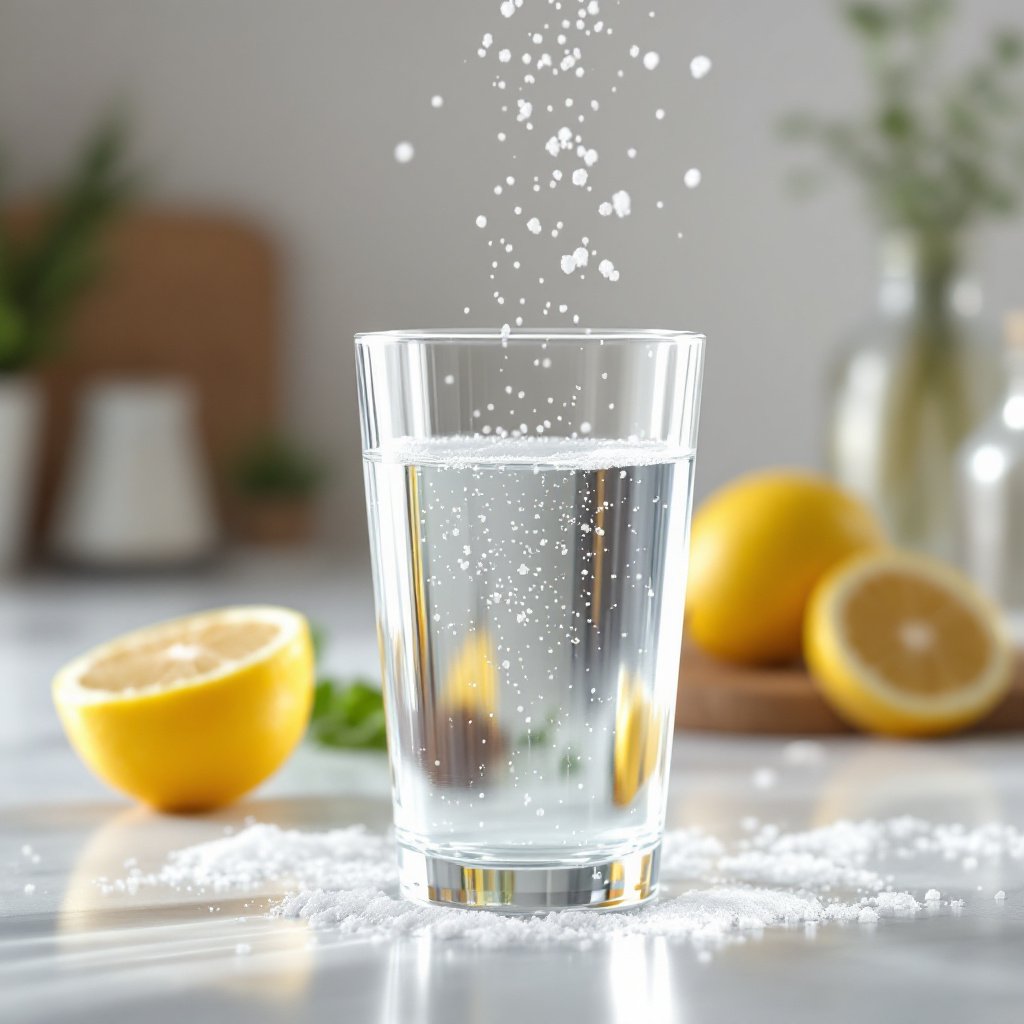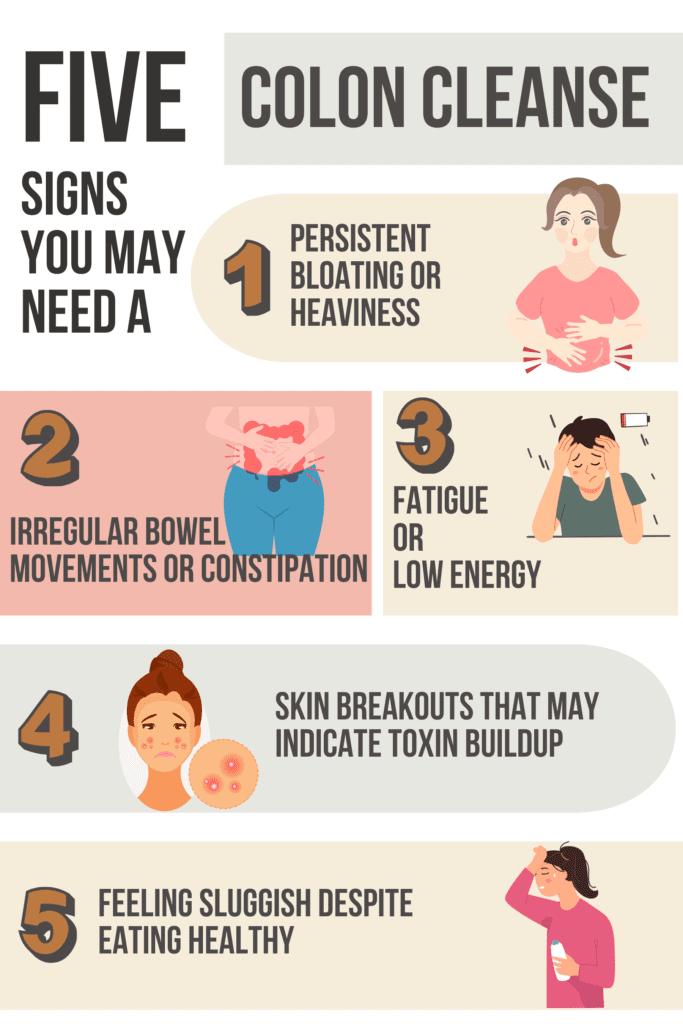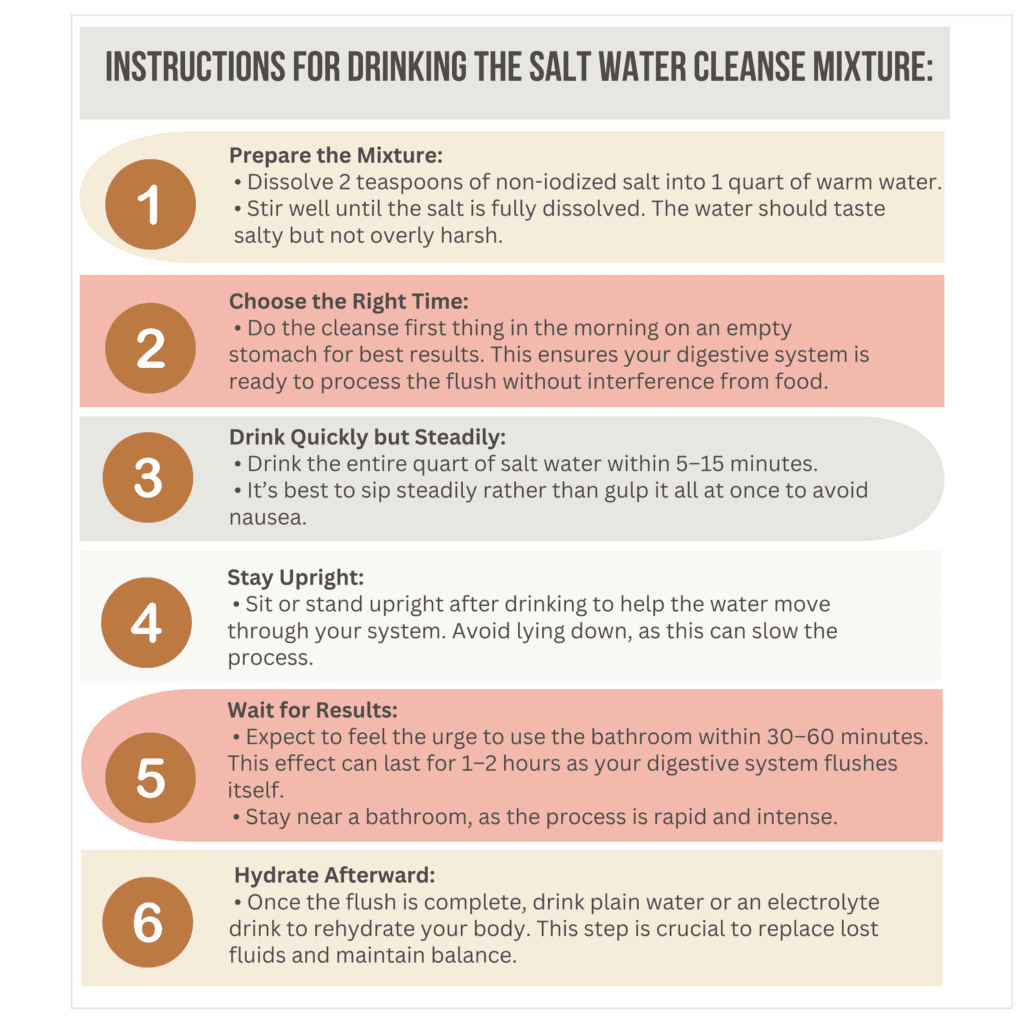How To Do A Salt Water Colon Cleanse
Table of Contents

Salt water cleanses are a great option for those looking to support digestion and detox naturally. However, finding the right balance is key. Do it too often, and you risk disrupting your body’s natural rhythm; too infrequently, and you may not see the benefits. So, how often should you perform a salt water cleanse? Read below for the tips on frequency, benefits, and precautions for this practice to ensure it’s safe and effective.
What is a Salt Water Cleanse?
A salt water cleanse, or salt water flush, is a detox method that involves drinking a mixture of warm water and non-iodized salt to stimulate bowel movements. Within hours, the cleanse clears your digestive tract, helping to remove waste and toxins.
Salt Water Colon Cleanse Recipe: The basic recipe typically includes 2 teaspoons of high-quality salt (such as sea salt or Himalayan pink salt) dissolved in 1 quart of warm water. This solution triggers a laxative effect, flushing out the intestines. (Complete instructions below).
Signs You May Need a Cleanse

• Persistent bloating or heaviness.
• Irregular bowel movements or constipation.
• Fatigue or low energy.
• Skin breakouts that may indicate toxin buildup.
• Feeling sluggish despite eating well.
While these signals can suggest a cleanse may be helpful, they’re not a substitute for addressing underlying health concerns. If symptoms persist, consult a healthcare provider.
Types of Salt to Use:
• Sea salt: A natural choice rich in minerals.
• Himalayan pink salt: Sought after for its purity and trace minerals.
• Unrefined non-iodized salt: Free of additives, making it suitable for cleansing.
It’s essential to avoid table salt, as it often contains additives that can interfere with the process.
Salt water cleanses are often used as part of a detox routine, to prepare for fasting, or to address occasional bloating and sluggish digestion. While not a long-term solution, they can provide a quick reset for your digestive system when done thoughtfully.
Benefits of Salt Water Cleansing
Salt water cleanses offer several benefits beyond immediate digestive relief. Here’s a closer look at why they’ve become a popular choice for gut health enthusiasts.
1. Digestive Reset and Detoxification
The cleanse works by flushing out waste and toxins from the intestines, providing a natural reset for your digestive system. By clearing the digestive tract, it can improve nutrient absorption, reduce bloating, and promote overall gut health. While your liver and kidneys handle most detoxification, a salt water cleanse acts as a gentle aid to support their function.
2. Relief from Constipation
If you struggle with irregular bowel movements or occasional constipation, a salt water cleanse can provide quick relief. The laxative effect encourages your digestive system to reset, helping to eliminate built-up waste.
3. Improved Skin Health

There’s a strong connection between gut health and skin health. By removing toxins and waste, a cleanse may lead to clearer, brighter skin over time. It’s a subtle but noticeable benefit of maintaining a healthy digestive system.
4. Enhanced Energy Levels
A clean digestive tract allows your body to focus on other essential functions, leaving you feeling lighter and more energized. Many people report a renewed sense of vitality after completing a cleanse.
This site is helpful if you’re wondering how long it takes to start working.
How Often Should You Do a Salt Water Cleanse?
The ideal frequency for salt water cleanses varies depending on your health goals, digestive health, and how your body responds. Here’s a breakdown to help you determine what’s best for you.
General Guidelines
For most people, once a week to once a month is sufficient. This range allows your body to reap the benefits of a cleanse without disrupting its natural processes. Overusing salt water cleanses can lead to dehydration or imbalance in gut bacteria, so it’s important to exercise moderation.
Frequency by Goal:
• Detoxification: For those doing a cleanse as part of a detox routine, a weekly cleanse for 1–2 months may be helpful. Monitor your body closely during this period.
• Occasional Relief: If you’re targeting bloating or constipation, a bi-weekly or monthly cleanse should be enough to reset your system.
• Maintenance: For general gut health maintenance, a cleanse every 4–6 weeks is typically safe and effective.
Remember, salt water cleanses are not meant to be a daily habit. They should complement a healthy lifestyle that includes a balanced diet, regular hydration, and adequate fiber intake.
Your body often gives clues when it could benefit from a salt water flush. Here are some signs to watch for:

Preparing for a Salt Water Cleanse
The key to a successful cleanse lies in proper preparation. Here’s how to ensure your experience is as smooth and effective as possible.
Before the Cleanse:
1. Pick the Right Time: Choose a morning when you have several hours to stay home, as the cleanse takes effect quickly.
2. Light Meals: Avoid heavy or greasy foods the day before. Opt for light, plant-based meals to ease digestion.
3. Stay Hydrated: Drink plenty of water the day before to prepare your body for the flush.
4. Use Quality Ingredients: Stick to non-iodized, additive-free salt.
5. Set Expectations: Be prepared for multiple trips to the bathroom as the cleanse works its way through your system.
Post-Cleanse Care
What you do after a salt water cleanse is just as important as the cleanse itself. Proper recovery ensures your body regains balance and maximizes the benefits.
1. Rehydrate: Salt water can dehydrate you, so drink plenty of filtered water or an electrolyte solution.
2. Ease Back Into Eating: Start with light, easy-to-digest foods like soups, smoothies, or steamed vegetables. Avoid processed or heavy meals.
3. Replenish Gut Bacteria: Include probiotics like yogurt, kefir, or fermented foods to restore healthy gut flora.
4. Rest if Needed: If you feel tired, allow your body time to recover before resuming normal activities.
Potential Risks and Precautions
Salt water cleanses are not suitable for everyone. Before trying one, consider the following risks and precautions.

Instructions for Drinking the Salt Water Cleanse Mixture:
1. Prepare the Mixture:
• Dissolve 2 teaspoons of non-iodized salt into 1 quart of warm water.
• Stir well until the salt is fully dissolved. The water should taste salty but not overly harsh.
2. Choose the Right Time:
• Do the cleanse first thing in the morning on an empty stomach for best results. This ensures your digestive system is ready to process the flush without interference from food.
3. Drink Quickly but Steadily:
• Drink the entire quart of salt water within 5–15 minutes.
• It’s best to sip steadily rather than gulp it all at once to avoid nausea.
4. Stay Upright:
• Sit or stand upright after drinking to help the water move through your system. Avoid lying down, as this can slow the process.
5. Wait for Results:
• Expect to feel the urge to use the bathroom within 30–60 minutes. This effect can last for 1–2 hours as your digestive system flushes itself.
• Stay near a bathroom, as the process is rapid and intense.
6. Hydrate Afterward:
• Once the flush is complete, drink plain water or an electrolyte drink to rehydrate your body. This step is crucial to replace lost fluids and maintain balance.
Who Should Avoid Salt Water Cleanses?
• Pregnant or breastfeeding individuals.
• People with heart or kidney conditions.
• Those with high blood pressure or on low-sodium diets.
• Individuals with gastrointestinal disorders like Crohn’s disease or IBS.
• Children and elderly individuals who may be more vulnerable to dehydration.
If you have any chronic health conditions or take medications, consult a healthcare provider before attempting a cleanse.
Common Side Effects:
• Dehydration or dizziness.
• Nausea or vomiting.
• Stomach cramps.
• Electrolyte imbalance.
If side effects persist or worsen, discontinue the cleanse and seek medical advice.

Summing It All Up!
A salt water cleanse can be a powerful tool for supporting digestion and overall health when used responsibly. The key is moderation—start cautiously, listen to your body, and adjust the frequency to match your goals. With proper preparation and recovery, a salt water colon cleanse can leave you feeling refreshed, lighter, and ready to embrace healthier habits.
Have you tried a salt water cleanse? Share your experience in the comments below!
I am not a doctor. Always consult with your healthcare provider before following advice here.


